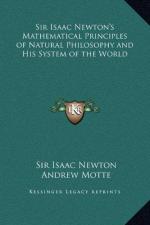|
This section contains 6,393 words (approx. 22 pages at 300 words per page) |

|
Dictionary of Literary Biography on (Sir) Isaac Newton
Sir Isaac Newton, mathematician and natural philosopher, has been called the greatest English scientist and the father of modern empirical science. He invented the method of fluxions, which forms the basis of modern calculus; discovered the composition of light; formulated the law of universal gravitation, which he presented to the world in his major work, Philosophiæ Naturalis Principia Mathematica (better known as the Principia, 1687); formalized Galilean mechanics; and made notable contributions to the theory of light and the science of thermometry. Like Albert Einstein, he revealed the microcosm and the macrocosm together, reducing a welter of phenomena to a single formula: Newton's equation for the law of gravity, F=Gm1m2/r2, is considered the historical equivalent of Einstein's equation for the equivalence of energy and mass, E=mc2.
Newton's mechanistic worldview replaced the long-held cosmology of Aristotle, and his influence on post-Enlightenment thinking across several disciplines...
|
This section contains 6,393 words (approx. 22 pages at 300 words per page) |

|


